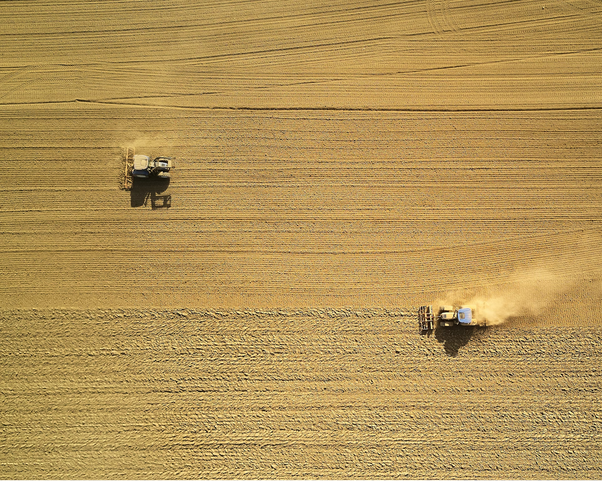Blockchain is better than ever – and we can see why. When you look at the Bitcoin price today, it’s one of the most stable, steady-growing cryptos, with applications benefiting almost every industry imaginable.
Read on to learn about agriculture and crypto partnerships changing the industry.
Contents
Blockchain Enhances Transparency and Traceability in Agriculture
One of the most attractive features of blockchain is the increased transparency and traceability of goods, especially across the supply chain.
Farmers, wholesalers, and other stakeholders can access the private and secure farm-to-table ledger once a product leaves the farm. As a result, it makes a significant difference to the consumer, who wants to know where and how his food was grown. We’d say this is becoming more of a trend now with social media going crazy for healthy living and where ingredients come from.
One example is the traceability of Mousline, a famous brand of mashed potatoes, which is becoming an efficient multi-trade system thanks to a partnership of Nestlé, Carrefour, and IBM. As explained, blocks on IBM’s Food Trust blockchain are traceable to the single potatoes used in the product.
AgUnity, a non-profit organization on a mission to fight poverty, also applied blockchain to enable smallholder farmers to access digital tools to engage more actively in global supply chains.
Smart Contracts Streamline Agriculture Transactions
The importance of the smart contract capability of blockchain technology in the agricultural sector is changing how transactions happen. Smart contracts are self-executing contracts with the terms written into the code itself. These contracts can carry out transactions, logistics, activities, and other crucial tasks.
By utilizing smart contracts, for example, farmers can sell their goods to consumers or retailers directly, without intermediaries and with lower transaction fees. This boost in automation allows farmers to receive their payment quickly while consumers enjoy lower prices. Smart contracts also guarantee that the payment is automatically released when the specified conditions, for example, product delivery fulfillment.
The use of blockchain and smart contracts in the grain industry was pioneered by AgriDigital, an Australian company. Under their solution, automated payments to farmers are made as soon as the grain is delivered and its presence established, another way of cutting time loss associated with traditional payment systems.
Empowering Smallholder Farmers with Blockchain Technology
There are opportunities for smallholder farmers, thanks to blockchain technology, which enables them to access international markets. In the past, farmers residing in developing nations had difficulties accessing buyers and depended on local markets or agents who took most of the profits. Blockchain helps alter this position by allowing farmers to deal directly with buyers in decentralized markets.
Blockchain technology is expanding new markets and giving way to better farm prices and fairness in trade. Farmers using blockchain can sell to buyers directly over the internet and receive fair product prices.
AgriLedger is one example of a company using this technology. This is a blockchain platform that links smallholder farmers from Haiti with their customers and provides relevant market information to them. AgriLedger helps small farmers by using blockchain technology to record all transactions and minimize the risk of middlemen taking advantage of tourists and farmers’ interests.
Improving Sustainability and Reducing Waste with Blockchain
The question of sustainability is becoming more and more relevant in agro-industries. Modern agriculture, as practiced today, is highly destructive and entails huge waste. One of the many possible uses of blockchain might be assisting the world in becoming more sustainable by recording various aspects related to agriculture, including the amount of water, carbon, and chemicals used.
With blockchain monitoring resource inputs and farming practice history, stakeholders can promote non-destructive methods using smart contracts like providing subsidies or premium prices in the market to farmers who practice low-chemical farming or regenerative agriculture.
Integrating blockchain technology strengthens the fight against food waste by offering clarity to the supply chain and tracking items in real time. In situations where a product has to be recalled, using blockchain allows for quick tracking of the affected items to help control the spread and reduce waste. Blockchain offers the assurance that only safe and high-quality products reach consumers by creating visibility.
Case Study: IBM Food Trust, Carrefour
The IBM Food Trust network, which seeks to protect the traceability of food and includes companies like Carrefour, is one of the most successful and promising agriculture and blockchain technology partnerships. We mentioned it briefly further in the article.
Carrefour integrates blockchain technologies to provide its users with a full range of information on the goods purchased. That includes where the products were grown and the facility where they were processed.
This information can be accessed by scanning a QR code, which is imprinted on the packaging, making it more convenient for shoppers to get the right products. Such a degree of openness in the food industry is becoming the norm and expected by customers. And we don’t blame them – we’d say it’s essential to know where your food is coming from.
We think the future of the agriculture sector is set to be different, more transparent, fair, and greener than before. We think more companies tied to agriculture should explore using it.
A New Era for Agriculture
The integration of blockchain technology into agriculture is revolutionizing the industry, offering transparency, efficiency, and fairness for all stakeholders involved. From improving traceability and ensuring product quality to empowering smallholder farmers and reducing waste, blockchain is creating more sustainable and equitable agricultural practices. As partnerships between agriculture and blockchain continue to grow, the potential for innovation and positive change is vast, ensuring that consumers, farmers, and the environment all benefit from this digital transformation.

Ross, an exam specialist with a passion for education, writes comprehensive articles on exam results and admit cards. His expertise ensures students receive reliable information and useful tips to excel in their exams.


























